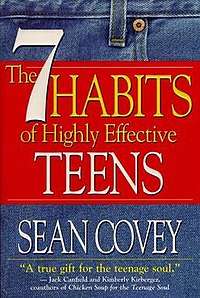The 7 Habits of Highly Effective Teens
The Seven Habits of Highly Effective Teens is a 1998 bestselling self-help book written by Sean Covey,[1] the son of Stephen Covey.[2][3] The book was published on October 9, 1998 through Touchstone Books and is largely based on The Seven Habits of Highly Effective People.[4] In 1999 Covey released a companion book entitled Daily Reflections For Highly Effective Teens.
 | |
| Author | Sean Covey |
|---|---|
| Country | United States |
| Language | English |
| Genre | Self-help |
| Published | October 9, 1998 (Touchstone Books) |
| Media type | |
| Pages | 288 |
| ISBN | 9780684856094 |
In 2000 The 7 Habits of Highly Effective Teens was named as one of the YALSA's "Popular Paperbacks for Young Adults".[5]
Synopsis
In the book Covey discusses how teenagers can become more independent and effective by following seven basic habits.[6] The habits range from being proactive in every aspect of one's life to planning and prioritizing one's daily life and responsibilities.[7]
Reception
Reception for the book has been positive,[8] with some schools including the text in their lesson plans.[9][10][11][12] A reviewer for the New Straits Times commented that the book's writing was "fun and lively" and called it a "fruitful read".[13] AudioFile gave the audiobook a positive review, citing Covey's narration as a highlight.[14] The 7 Habits of Highly Effective Teens has also been praised by several psychologists, although according to the Handbook of Self-Help Therapies the book has not been thoroughly tested as a part of a treatment plan.[15]
References
- "SURVIVAL TIPS FROM 'RETIRED' TEEN". The News Tribune. November 28, 1998. Retrieved 8 December 2012.
- "Guiding the way; Adolescents' self-help books could lead to improvement, problem solving". Boston Herald. Oct 5, 1998. Retrieved 8 December 2012.
- "PW: Bestsellers of 1999--Paperback: The Usual Suspects Prevail". Publishers Weekly. Retrieved 8 December 2012.
- "Seven Habits For Effective Teens". Gainesville Sun. Apr 16, 2000. Retrieved 8 December 2012.
- "2000 Popular Paperbacks for Young Adults". YALSA. Retrieved 8 December 2012.
- "Son's 'Highly Effective' book gives Mom hope". San Antonio Express-News. August 31, 2010. Retrieved 8 December 2012.
- Spenser, Sharon (2009). The Perfect Norm. Information Age Publishing. pp. 46–49, 61–66. ISBN 1607520338.
- "Review: The 7 Habits of Highly Effective Teens". Teen Ink. Retrieved 8 December 2012.
- "YOUNG LEADERS LEARN 7 SECRETS OF SUCCESS IN AN INNOVATIVE MIDDLE SCHOOL CLASS, STUDENTS ARE TAUGHT HOW TO BECOME "HIGHLY EFFECTIVE TEENS."". Orlando Sentinel. Nov 10, 1999. Retrieved 8 December 2012.
- "HABIT FORMING Middle school immerses teens in Covey program". The Dallas Morning News. September 26, 2000. Retrieved 8 December 2012.
- "Good 'Habits' may make good teenagers". The Providence Journal. Aug 6, 2003. Retrieved 8 December 2012.
- "Course on effective habits teaches teens a lesson for life". Kansas City Star. 2001-06-30. Retrieved 8 December 2012.
- "The Road to Difference". New Straits Times. Apr 4, 1999. Retrieved 8 December 2012.
- "THE 7 HABITS OF HIGHLY EFFECTIVE TEENS". AudioFile. 2002. Retrieved 8 December 2012.
- Watkins, Patti Lou (2007). Handbook of Self-Help Therapies. Routledge. p. 144. ISBN 0805851712.